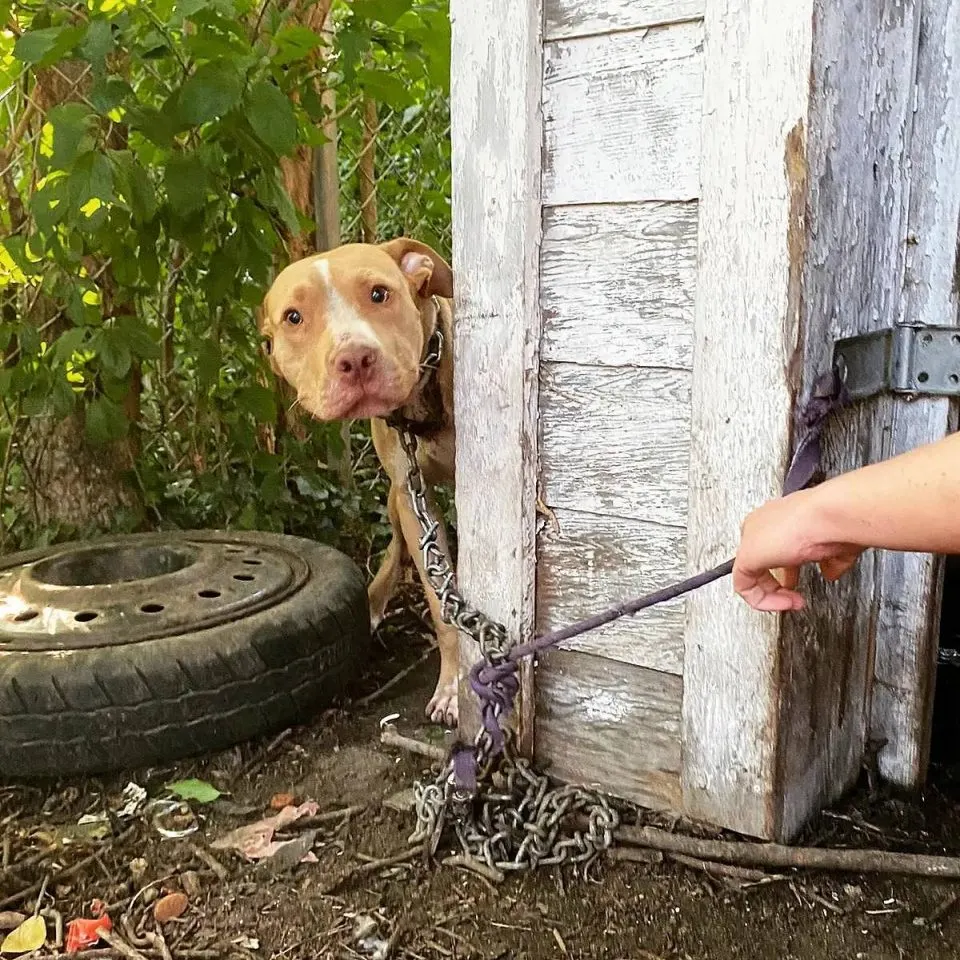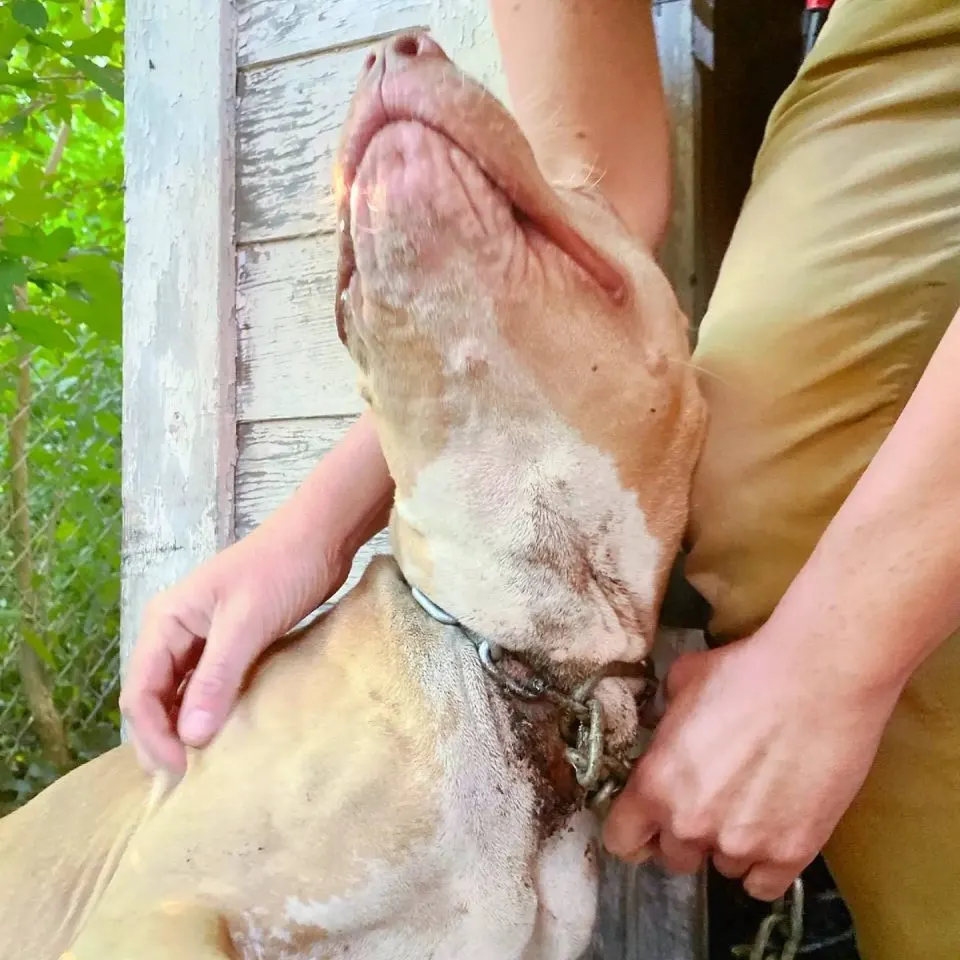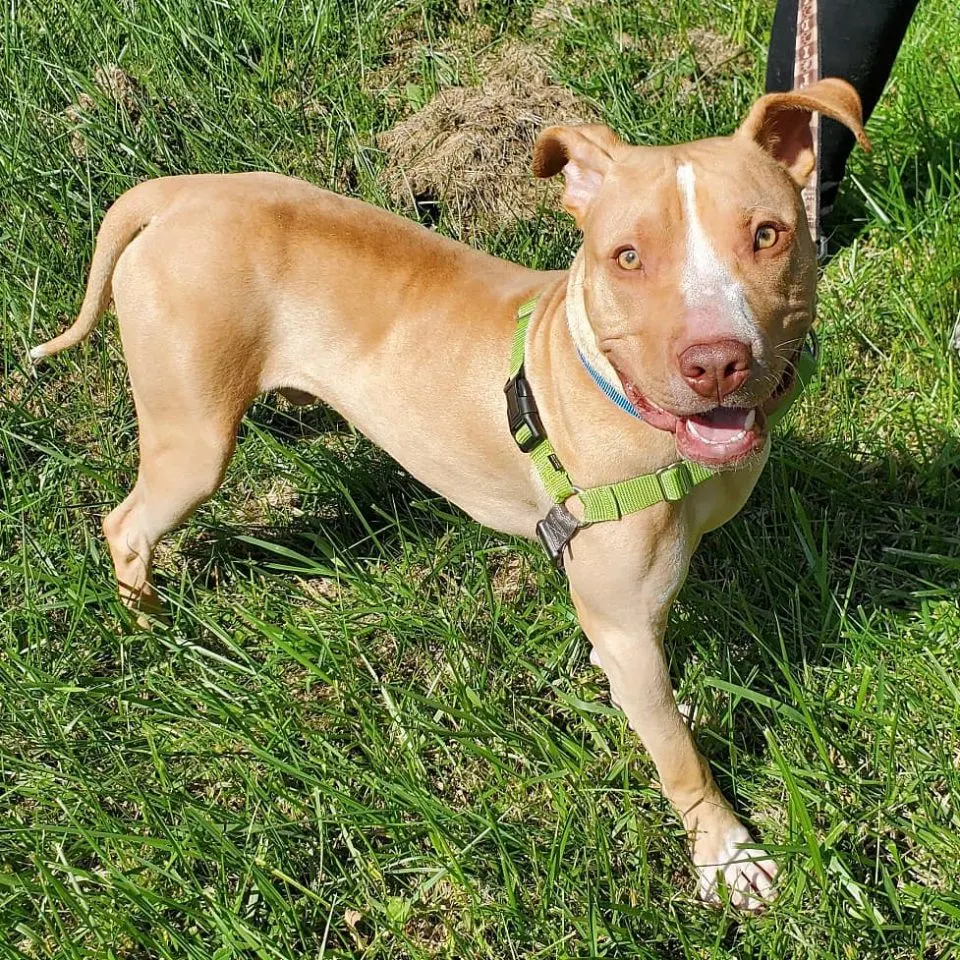When a man living in Detroit came home, he noticed something moving in the abandoned neighbouring house.
When he went to investigate, he was met with the most adorable dog who was, unfortunately, chained to the house.
Rescue Mission

The man immediately called for help, and Rebel Dogs Detroit was happy to answer the call.
They sent one of their volunteers, Tiffany Perkins, to check what was going on, and as soon as her eyes met the little pup, now named Beaker, her heart melted.
“Beaker was timid and cowered behind the garage to hide. He peeked out the side as I started calling for him. As I got closer, his tail started wagging. Then he pushed his weight against us for petting him — and seemed to be visibly relieved. He ‘meeped’ like a muppet, he was so excited, so he got the name Beaker!” said Tiffany.
Since Beaker had been tied away all alone for such a long time, he was a bit frightened of the hooman who approached him.
But, it only took him a few minutes to realize that Tiffany was there to help!

Tiffany immediately unchained him from the house, and Beaker couldn’t have been more excited to finally be free.
Unfortunately, Tiffany noticed that Beaker had the chain stuck on his neck, making her rush him to the vet for a checkup.
At The Vet
While the vets were getting ready for surgery, Tiffany took the time to bond with Beaker even more, showering him with love he didn’t get before, but surely deserved.

“We had lots of bonding time in the car waiting for his surgery for 5+ hours. He was napping with his head in my lap after a while,” Tifanny said.
Even though this dog had been through a lot, he did not let that stop him from having fun or soaking up every ounce of love that had been thrown his way.
Luckily, the surgery was a success and Beaker was taken to a foster home for his recovery.

Beaker seems to have left his past life behind and is enjoying his new one filled with people who care for him and continue to shower him in adoration.
“He’s learning how to be an indoor dog with unconditional love in his foster home,” Tifanny said.

Beaker is all healed up now and is currently looking for a forever home, preferably one with another energetic dog with whom he will enjoy long walks and playdates filled with never-ending fun.
The Origins of “Glizzy”
A Look Into Hot Dog Slang
Hot dogs are known by various names across different regions and communities. “Glizzy” is a term that has gained popularity, particularly in urban areas like Washington D.C. and Baltimore, Maryland. The slang term “glizzy” is believed to have originated in the local street culture and has become a widely recognized term for hot dogs in these areas.
Regional Vernacular and Pop Culture
The use of slang terms for hot dogs reflects the diversity and richness of regional vernacular and pop culture. In certain communities, using unique terms like “glizzy” adds a sense of identity and belonging, creating a shared language among locals. These regional variations in language highlight how food can be intertwined with cultural expressions and social dynamics, shaping the way we talk about and enjoy our favorite foods.
The “Glizzy” Phenomenon Explained
Social Media’s Role in Launching the Term
Social media played a pivotal role in popularizing the term “glizzy” as a slang for hot dogs. Platforms like TikTok and Instagram have been key in spreading the use of the term beyond local communities. Users sharing funny videos and content featuring “glizzies” boosted its visibility and made it a trending term across different regions.
Glizzy in Memes and Virality
The term “glizzy” gained further momentum through memes and virality on various social media platforms. Memes depicting hot dogs as “glizzies” with humorous captions and creative content contributed to its widespread adoption. The inherent humor and relatability of these memes made “glizzy” a household term, transcending its origins and becoming a cultural phenomenon.
The Evolution of Hot Dog Names
From German Roots to American Streets
Hot dogs have a fascinating history that dates back to the 15th century. Originating in Frankfurt, Germany, sausages known as “frankfurters” were popular. Upon arriving in America, the term “hot dog” took hold, likely due to their association with various sporting events in the late 19th century.
The Journey from Frankfurters to Glizzies
The term “glizzy” is a product of modern culture, specifically gaining prominence in regions like Washington D.C. and Baltimore. It has become a widely recognized slang term for hot dogs, showcasing how language evolves with communities. With social media’s pervasive influence, “glizzy” has transcended its local roots, now embraced by a broader audience.
The Debate Around Hot Dog Nicknames
Diverse Opinions on “Glizzy”
People have varied opinions on the slang term “glizzy” for hot dogs. Some view it as a fun and trendy way to refer to the classic food item. Others see it as a regional term that adds a sense of local flair to the culinary scene. Regardless of perspective, the term “glizzy” sparks conversations and highlights the dynamic nature of language and food culture.
What’s in a Name? The Power of Language in Food Culture
The debate on hot dog nicknames reflects the power of language in shaping food culture. From traditional terms like “frankfurter” to modern slang like “glizzy,” each name carries a unique history and cultural significance. Language not only communicates what we eat but also connects us to our roots and communities. The evolution of hot dog nicknames underscores the richness of culinary diversity and the role of language in preserving food traditions.
Conclusion
So, there you have it! “Glizzy” has taken the hot dog world by storm, evolving from a regional slang term to a viral sensation thanks to social media. It’s fascinating to see how language adapts and grows with the communities that use it. Whether you’re a fan of the term or not, one thing’s for sure – hot dogs will always have a special place in our hearts and on our plates. Keep enjoying those glizzies, and remember, language is a living thing that reflects our ever-changing world. Cheers to the power of words and the deliciousness of hot dogs!
Frequently Asked Questions
What is the cultural significance of the term “Glizzy”?
The term “Glizzy” is a slang word predominantly used in urban areas like Washington D.C. and Baltimore to refer to hot dogs. It reflects local diversity and fosters a shared identity among communities.
How has social media impacted the popularity of the term “Glizzy”?
Social media platforms have played a crucial role in popularizing the term “Glizzy” beyond its regional origins through humorous content, making it more widely recognized and accepted.
What is the historical evolution of hot dog names?
Hot dogs have evolved from German sausages, originally known as “frankfurters,” to being commonly referred to as “hot dogs” in the U.S., showcasing the transformation of food names over time and across cultures.
Why is the term “Glizzy” considered a modern slang term for hot dogs?
“Glizzy” has emerged as a modern slang term for hot dogs, demonstrating how language evolves with communities and gains broader acceptance, particularly through the influence of social media.
How do opinions differ regarding the use of the term “Glizzy” for hot dogs?
Some individuals see “Glizzy” as a fun and trendy way to refer to hot dogs, while others consider it a regional term that adds local flair to the culinary scene, sparking a debate on hot dog nicknames and the dynamic nature of language and food culture.
[no_toc]

Hey there, I’m Janet Brooks, a dog-loving student from California. I’m all about helping pups in need, especially those without homes. Me and my awesome friends work together to give shelter and love to stray dogs. Oh, and I also write blogs about dogs to share helpful info.